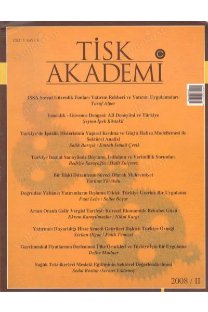Beşeri Sermayenin Türkiye'de Bölgeler Arası Ekonomik Gelişme Açısından Önemi
Bu çalışma, beşeri sermayenin Türkiye’de bölgesel gelişme farklılıkları üzerindeki etkisini incelemeyi amaçlamaktadır. İktisadi büyüme yazını beşeri sermaye birikimi ile milli gelir artışı arasında sıkı bir ilişki olduğunu ortaya koymaktadır. Bu ilişkiyi bölgesel düzeyde araştırmak için, bölgesel kamu eğitim ve sağlık harcamaları modellenmiştir. Bölgesel kamu eğitim ve sağlık harcamaları ile bölgesel GSYİH arasındaki ilişkinin yönü ve büyüklüğü,1990–2001 yılları için Düzey 1 bölgelerinde, E-Views 5.0 ekonometrik paket programı kullanılarak analiz edilmiştir. Bunun yanı sıra, tüm bölge verileri panel data yöntemiyle incelenmiş ve elde edilen sonuçlar her bir bölge ile karşılaştırılmıştır. Sonuçlar, tüm bölgeler için olmasa bile, bazı bölgelerin istatistiksel olarak farklılıklar gösterdiğini ortaya çıkarmıştır.
Anahtar Kelimeler:
Türkiye
The Importance of Human Capital on Turkey’s Regional Development
Economic growth literature shows that there is a direct and strong relationship between human capital accumulation and the growth of national income. This study aims to analyze the importance of human capital in regional economic development of Turkey. In terms of data, Turkish Statistical Institute’s First Level Regional data has been used for the period of 1990-2001. We considered education and health investments as components of economics growth. Since there is no city level economic growth data available for Turkey, we used GDP figures as indicator of economic growth. In order to determine the regional differences E-Views 5.0 Econometric Package has been used and the required tests have been done. The results indicate that even if not for all, some regions show statistically different characteristics.
Keywords:
Turkey,
___
- Barro, R. J.; Sala-i-Martin X. (1995), Economic Growth. McGraw-Hill.
- DPT (2003), İllerin ve Bölgelerin Sosyoekonomik Gelişmişlik SIralaması Araştırması. Erişim adresi: _____http://www.ekutup. dpt.gov.tr/bolgesel/gosterge/2003 05.pdf>.
- DPT (2006), 2006 Yılı Programı. Erişim adresi: _____http://ekutup.dpt.gov.tr/ program/ 2006.pdf>.
- Elvan, L. (2002), Türkiye’de Bölgelerarası İktisadi Gelişmişlik Farklarının GSYİH (iller endeksi) Esas Alınarak Karşılaştırılması. DPT Planlama Dergisi, Özel Sayı, 327–336.
- Gümüş, S. (2005), Beşeri Sermaye ve Ekonomik Kalkınma: Türkiye Üzerine Ekonometrik Bir Analiz (1960–2002). İstanbul, İktisadi Araştırmalar Vakfı.
- Lucas, R. E. (1988), On the Mechanics of Economic Development. Journal of Monetary Economics, 22 (1), 3-42.
- Mankiw, N. G.; Romer, D.; Weil D. N. (1992), A Contribution to the Empirics of Economic Growth. Quarterly Journal of Economics, 107 (2), 407-437.
- OECD (2005), Education at a Glance Indicator. Erişim adresi: _____http://www.sourceoecd. org/education/ 9264011900>.
- Saygılı, Ş.; Cihan, C.; Yavan, Z. A. (2005), Eğitim ve Büyüme. Türkiye İçin Büyüme Stratejileri Konferansı Tartışma Tebliğleri. Haziran 2005, TÜSİAD-EAF, İstanbul. 123–179.
- Thirlwall, A. P. (2002), The Nature of Economic Growth: An Alternative Framework for Understanding the Performance of Nations, Cheltenham, Edward Elgar Publishing.
- UNDP (2004), Information and Communication Technologies. Human Development Report: Turkey 2004.. Erişim adresi: _____http://www.undp.org.tr>.
- UNDP (2005), Human Development Report. http://www.sd.undp.org/HDR/HDR0 5e.pdf>
- UNDP (2006), Human Development Report. http://www.hdr.undp.org/hdr2006
- UNESCO-UIS/OECD (2005), Education Trends in Perspective: Analysis of the Education Indicators. Erişim adresi: _____http://www.uis.unesco.org/TEMPLATE/ pdf/wei/ WEI2005.pdf>.
- ISSN: 1306-6757
- Yayın Aralığı: Yılda 2 Sayı
- Başlangıç: 2006
- Yayıncı: Türkiye Isveren Sendikalari Konfederasyonu
Sayıdaki Diğer Makaleler
Üçüncü Kişinin Uğradığı Kazada İşveren Kusurunun (Taksirinin) Kapsamı
Beşeri Sermayenin Türkiye'de Bölgeler Arası Ekonomik Gelişme Açısından Önemi
Selahattin BEKMEZ, AYLİN ÇİĞDEM KÖNE, Derya GÜNAL
Sabit Yatırım Harcamalarının Öncü Göstergeler Yöntemiyle Tahmini: Türkiye Örneği
Liderlik Tarzları ile Örgüt Kültürü Türleri Arasındaki İlişkiler: Bir Alan Çalışması
Psikolojik Taciz Davranışının Kamu Kurumları Arasında Karşılaştırılması Üzerine Bir Araştırma
Avrupa Birliği Müktesebatı Işığında Alman Hukukunda Toplu İşçi Çıkarımına İlişkin Yasal Çerçeve
Türk Hukukunda Deneme Süreli İş İlişkileri
Uluslararsı Göç ve Kalkınma Tartışmalarında Yeni Yaklaşımlar ve Türkiye
